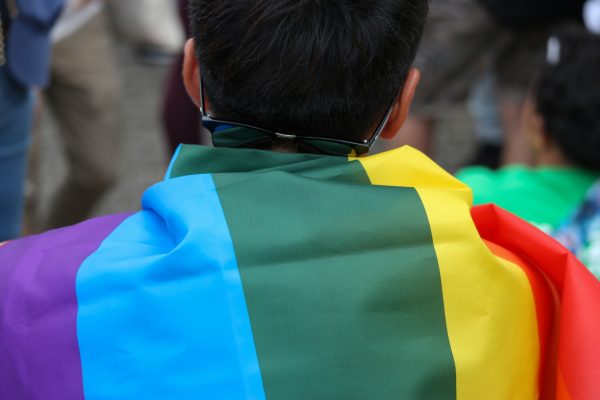Tokyo Report | Society | East Asia
Securing legal protections for sexual minorities is agonizingly slow in a country playing catch-up.
The neighborhood of Shinjuku in central Tokyo is buzzing with nightlife, skyscrapers, shrines and is home to a flourishing LGBTQ+ community. The pocket of “Nichome” in Shinjuku is known for its back-to-back gay and lesbian bars, transgender cabarets and fetish performances. It’s an open-secret and a safe haven for like-minded members of the community. But outside Nichome, sexual minorities struggle to find acceptance in daily life, school and in the workplace.
Last month Japan passed its first law addressing LGBTQ+ discrimination. It aims to promote the understanding of sexual minorities by stating that “efforts” should be made by national and local governments, employers and educational institutions to promote sexual diversity and gender identity. But campaigners have criticized the legislation as being watered down by conservative members of the Japanese Diet. The legislation does not explicitly outlaw discrimination against LGBTQ+ community or guarantee human rights.
The Japan Alliance for LGBTQ+ argues that the definition of “discrimination” is too narrow as the legislation stipulates that only “unfair discrimination” will not be tolerated. There are also no state-set guidelines on how to implement the law. LGBTQ+ rights advocates condemned a last-minute controversial clause stressing that the law’s measures should be implemented in a way so that “all citizens can live with ease.” Experts have pointed out that the revised legislation is impossible to implement as policies will need to consider whether a person will feel uneasy about a particular policy promoting the inclusion of a sexual minority.
Despite this setback, the government continuously faces pressure from LGBTQ+ advocates and the international community. Unlike its G-7 allies, Japan has not legalized same-sex marriage. In 2015, some local municipalities rolled out same-sex partnership certificates which offer some welfare services typically available to heterosexual couples. They also sought to make it easier for same-sex couples to rent housing, apply for a mortgage, and give consent for medical procedures. So far, these certificates are offered by approximately 70 percent of the country. Although they have no legal validity, proponents aimed to raise community awareness. But seven years later, the LGBTQ+ community are still campaigning for deeper recognition and human rights.
Diplomat Brief
Weekly Newsletter
Get briefed on the story of the week, and developing stories to watch across the Asia-Pacific.
Get the Newsletter
For transgender people, bathroom use in public remains a contentious issue. This month Japan’s top court passed a landmark ruling in favor of a transgender woman who sued her employer over bathroom restrictions at work. The transgender public servant who is in her 50s is from the Ministry of Economy, Trade and Industry (METI). She initially asked her supervisor to be able to use the female toilets but was only given permission to use the female toilets two floors away. The transgender woman first lodged a complaint with the National Personnel Authority in 2013 but filed a lawsuit in 2015 after her complaint was rejected. In June, the Tokyo High Court found that restrictions on bathroom use for transgender women are illegal as it goes “beyond the ministry’s discretionary power and therefore invalid.” The ruling is a significant breakthrough for the LGBTQ+ community in Japan. The plaintiff said she hopes the ruling will inspire better treatment of sexual minorities in the workplace.
The Japanese government has had a rocky relationship with sexual minorities. Under Japan’s Gender Identity Disorder Special Cases Act, transgender people must undergo surgery or sterilization in order to be legally recognized according to their gender identity. They must also be medically diagnosed with a gender identity disorder in order to have identification paperwork updated.
Prime Minister Kishida Fumio remains cautious on same-sex marriage. He has stated that Japan’s ban on same-sex marriage was not discrimination, insisting that the constitutional scope of marriage is a heterosexual one. Kishida’s ruling-Liberal Democratic Party (LDP) has the lowest proportion of lawmakers in favor of same-sex marriage. Ultraconservative lawmakers within the party have justified their stance on same-sex marriage as going against traditional family values. The opposition argues the reason is due to the LDP’s links to right-wing interest groups such as the controversial Unification Church.
Over the years there have been regional lawsuits challenging the constitutionality of the same-sex marriage ban. In 2021 the Sapporo district court in Hokkaido ruled that not allowing same-sex marriage was unconstitutional. However, the following year the Osaka District Court ruled marriage as between a man and a woman for the purpose of reproduction. A Tokyo District Court, while upholding a ban, said the lack of protection for same-sex families violated their human rights.
Advertisement
At the same time, social attitudes are shifting particularly among young people. A public opinion poll by Mainichi Shimbun revealed that 65 percent of people in Japan believe the government is “not protecting” the rights of sexual minorities. It also found that more than 50 percent of respondents support same sex marriage while 20 percent responded with “I don’t know,” indicating there is still room for mainstream society to learn about sexual diversity and acceptance.
The inclusion of sexual minorities in mainstream Japanese society is an uphill struggle. LGBTQ+ advocates face tremendous political resistance despite securing some favorable legal rulings. Coming out as LGBTQ+ can result in stigma and discrimination which leads people to hide their gender identity and sexual orientation. For the time being pockets like Nichome in Tokyo will remain a welcoming refuge for sexual minorities.
